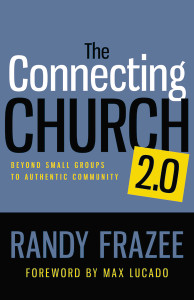I believe that the Church is unhealthy. It is disfigured, but there is something we can do about it. Continue reading
Tag Archives: Intergenerational
Response to…Why Generation Y Yuppies are Unhappy.
I was alerted to a recent post entitled “Why Generation Y Yuppies are Unhappy.” As soon as I started to read, I was disappointed on several measures, but before I proceed, let’s try to confirm a few things.
First of all, I would like to attempt to make a few  distinctions about who the writer is describing. The author defines Generation Y as those who are between the ages of 23 and 34. This generation is also called Millienials (a term that I prefer, but only time will tell which term will stick). The author then narrows the audience to Yuppies, but fails to define the term. Yuppies is not a technical term, but generally refers to “a young college-educated adult who is employed in a well-paying profession and who lives and works in or near a large city.”
distinctions about who the writer is describing. The author defines Generation Y as those who are between the ages of 23 and 34. This generation is also called Millienials (a term that I prefer, but only time will tell which term will stick). The author then narrows the audience to Yuppies, but fails to define the term. Yuppies is not a technical term, but generally refers to “a young college-educated adult who is employed in a well-paying profession and who lives and works in or near a large city.”
The author states that a “large portion” of 23 through 34 year olds fit this description. Validating such a statement would be impossible, but it is simply not accurate. For the percentage of this age demographic that: are college-educated, well-paying professionals, and near or in a large city would not be the “large portion” that the author claims.
The author then gives “yuppies” of Generation Y another nickname – Gypsy – which is defined as one who “thinks that they are the main character of a very special story.” Nicknames are always beneficial for the building up of any society and community. I am so glad the author seeks to establish a new one (I hope you note my extreme sarcasm).
As Christians, I believe it is important to look briefly at the definition of Happiness, which is stated as:
Happiness = Reality – Expectations
There definitely is some truth to the concept that our expectations in life affect our emotional well-being. However, this simplified and secular view, while useful to the author’s point is lacking in many ways. Even for those who are not believers, the sole source of Generation Y’s happiness is not based on their career and affluence.
The author states that three “facts” about Yuppies. Since when did these points become facts? This article is clearly lacking academic integrity. If you are making general statements about these Gypsys (which is only generally defined), then don’t claim that they be factual knowledge. We allow you to make observations, but not lay claim to facts.
1. They are Wildly Ambitious.
Looking for more than the success of their parents, Generation Yer’s want a fulfilling career. They want their work to have deeper meaning than making money. There is nothing wrong with this desire, and in fact money should not be the primary purpose of our work while here on earth.
The problem is that there is a clear gap between their expectations and reality. This gap is real, and has impacted their emotional health. However, we must acknowledge that this gap is due to many factors and changes within our society, and not solely based on their unreal expectations.
Generation Y has received the message that they are special from parents, friends, churches, and other aspects of society. This message is a cause of their disappointment, and is not able to stand under Biblical scrutiny. While God created us each unique, this uniqueness does not guarantee career and financial prosperity. I feel this needs revised for the next generation.
2. They are Delusional.
At this point in the article, you realize that this article was written simply to cause conflict and bring hits and more advertising to their website. The use of this term is unfair, unkind, and purposefully demeaning (I haven’t even mentioned the artwork.)
![girl-woman-hair-1276336-l[1]](http://www.earesources.org/wp-content/uploads/2013/09/girl-woman-hair-1276336-l1-203x300.jpg) To cast such a label on Generation Y is completely unhelpful to society. Read the responses following the article. Name calling, nicknaming, and blaming other generations only leads to further division within our homes, our churches, and our society.
To cast such a label on Generation Y is completely unhelpful to society. Read the responses following the article. Name calling, nicknaming, and blaming other generations only leads to further division within our homes, our churches, and our society.
The point the author was trying to make (which is almost a repetition of the first) is lost amidst the desire to stir up controversy. The point that I agree with is that, Emerging Adults struggle with unrealistic expectations of what lies ahead following high school graduation. As a society, we should be seeking to help them manage their expectations rather than call names. Let us not set an example of blaming and name-calling, but of serving, encouraging and loving others.
3. They are Taunted.
The development of Facebook other on-line communities definitely impacts the emotional health of all humans. The authors state that they are taunted by the images of their peers having more than they do. I would call it “Facebook Envy.” As you scroll through the web, it can cause a person to feel unfulfilled while others appear happy. Instead of keeping up simply with the Jones, you are forced to keep up with everyone within your on-line community.
There is a real danger with comparing yourself with others. 2 Corinthians 10:12 says, “We do not dare to classify or compare ourselves with some who commend themselves. When they measure themselves by themselves and compare themselves with themselves, they are not wise.”
However this point is true regardless of age, and should not be linked only with Generation Y.
As for the advice, let us all be Ambitious not for the sake of career or financial stability, but for the sake of Bringing Christ into the Darkness wherever we go. Know that you are special in the eyes of God for you are crafted for the purpose He has for you. Learning to quit comparing yourself to others is wise, biblical, and useful for anyone regardless of age.
More importantly, we need to build bridges between the generations rather than destroying them.
Making demeaning generalizations about another generation only leads to widening the gap between us.
The Connecting Church – Book Review
 Have you ever tried attending a small group, only to find it didn’t provide the Community that you longed for?
Have you ever tried attending a small group, only to find it didn’t provide the Community that you longed for?
The one act in the Creation record that is not labeled as good is that man was alone. God created us to have community with Him and one another. According to Frazee, “People need to be involved in meaningful and constant community or they will continue on indefinitely in a state of intense loneliness.” (Frazee)
Frazee points out that America’s obsession with independence often keeps them from seeking the community that the need. It is essential for the individual to be able to develop a community in order sustain healthy adulthood. Frazee says, “I would suggest that one of the major obstacles to community is America is that we don’t need each other anymore. We are independent people. … Sadly, when a person becomes independent of others, they get the loneliness and isolation that accompany it as well.” (Frazee)
Here a few of Frazee points that I believe are worth noting.
Beyond Small Group Ministry
Many churches advertise that people will find community in a small group, but they might as well be selling snake oil. Hopeful of finding authentic community, many people leave a small-group feeling disillusioned and frustrated. The purpose of small groups is not small groups. The purpose is to achieve, “The development of meaningful relationships where every member carries a significant sense of belonging [which] is central to what it means to be the church. (Frazee) We must remember that our goal is authentic community, and I believe Frazee’s book gives great direction to individuals and churches to reach that goal.
Simplify Church
Frazee is not a fan of complex, program-driven churches. “This will require that the church not develop competing activities or functions at the church but rather allow the small group members to simplify their church lives by means of this one group.” (Frazee) One reason is because they are not looking for more activities, EA are looking for people to share the simple pleasure of life – eating, playing, and talking. They will not have time to do life together if they are always running to support church functions.
Breaking Down Walls between the Generations
My favorite points by Frazee is his desire to see multi-generational relationships within the church. He says, “Many church leaders still believe that the most effective grouping of people is centered around the sharing of a common life-stage experience.” (Frazee) I am glad that this mindset is beginning to be questioned, and in some brave churches it is being destroyed. He goes on to state, “The life-stage mind-set is so ingrained that it has a powerful effect both on the youngest members of our community as well as the oldest. As our children grow up, many are not comfortable in relating to people of other ages.” (Frazee)
Could their inability to relate to other age groups be a reason why some leave the church?
I thoroughly enjoyed reading Frazee’s book because it reminded me of my own longings of authentic community- an ever-changing game of catch and release.
Causes of Delayed Development (Part 1)
There are many reasons that adolescents mature at different rates. Some of these are within their control, while others are not. The delayed development of adolescents is not simply due to a lack of effort among this generation. Changes within our society have greatly influenced who they are, and what they will become. In these posts, I want to give an overview of possible causes for the delayed development of adolescents including: economic changes, parenting style, delay of marriage and parenting, changes in educational patterns, isolation from adults, and adolescent perceptions of adulthood. Continue reading
“Why Millenials are leaving the Church?” – My Voice in the Conversation
There are many articles circulating around the web about why Millenials are leaving the church. I am not a Millennial, but having worked with this age group within the church for the past twelve years, I have a few thoughts to add to the conversation. Continue reading
Why won’t they just grow up?
There are many reasons that adolescents mature at different rates. Some of these are within their control, while others are not. The struggles of emerging adults are often interpreted as a lack of initiative or reluctance to grow up.  Continue reading
Continue reading






